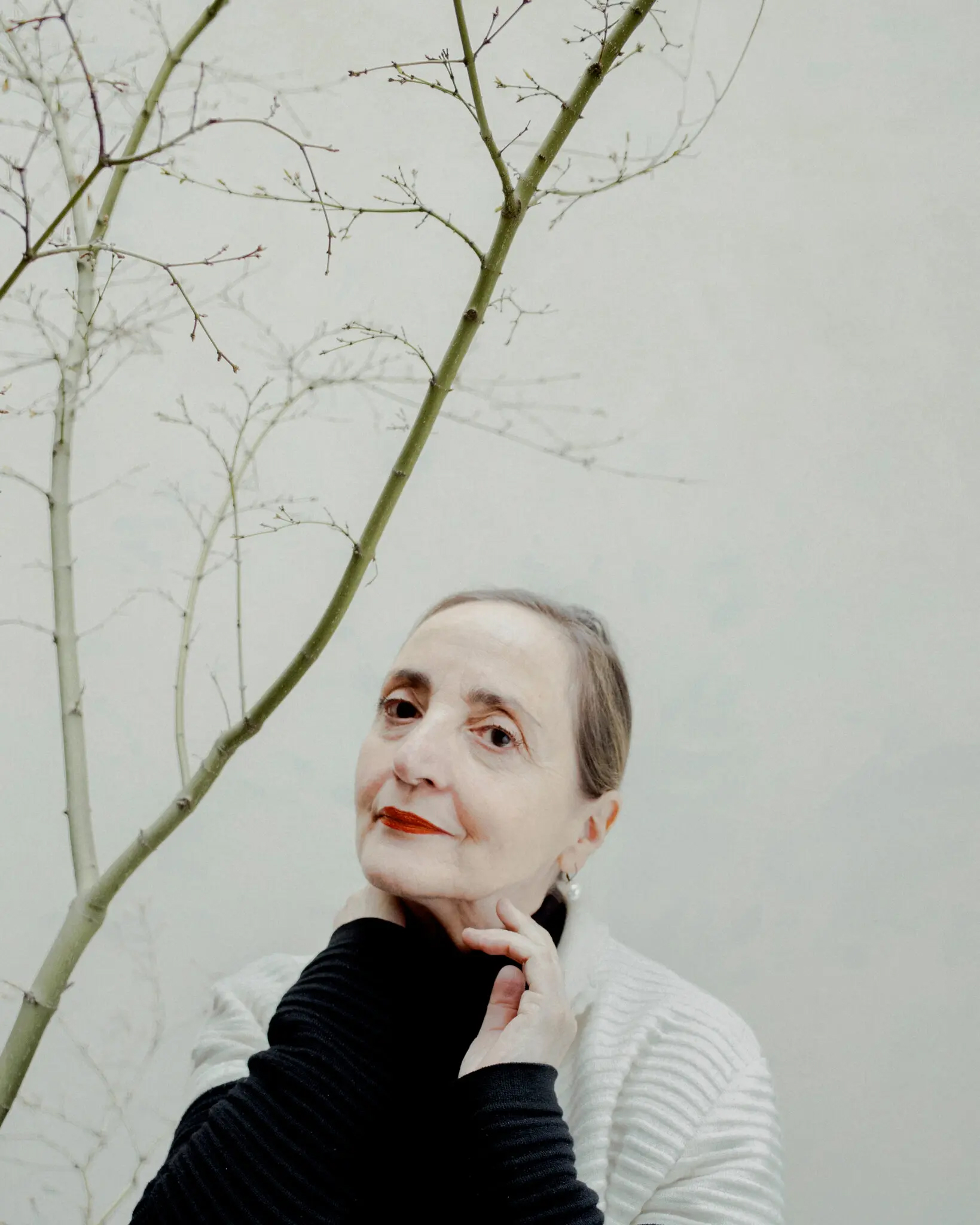A French Star Brings Her Career-Saving Play to New York

Photo : Elliott Verdier for The New York Times
After roles dried up, Dominique Blanc reclaimed her artistic agency by taking a one-woman play on the road. Now she’s making a rare appearance in Manhattan.
In 2003, three decades into her career, Dominique Blanc experienced every actor’s worst nightmare : The phone stopped ringing.
Approaching 50, she was one of France’s most celebrated performers, fresh off an acclaimed stage run in a classic tragedy, Jean Racine’s “Phèdre.” But the subsequent, yearslong lack of offers “deeply unsettled me,” Blanc said in a recent interview. “I found myself in extreme solitude. I really believed I would never be able to set foot on a stage again.”
“La Douleur,” a searing, award-winning one-woman show that will have its American premiere at the FIAF Florence Gould Hall in New York on March 13, became a way to process the hurt and take charge. Blanc’s character, lifted from a book by the French author Marguerite Duras, awaits her husband’s return from a Nazi concentration camp in 1945, uncertain whether he is even alive.
The show grew out of a series of readings she did from the book with the director Patrice Chéreau, a longtime collaborator. In 2008, Blanc pitched him a light stage version, requiring only a table, chairs and old costumes from Blanc’s closet. While Duras’s book was translated into English as “The War : A Memoir,” its original title simply means “Pain,” and in her show, Blanc starkly recreates women’s anguish as their partners return from untold horrors.
“It was the first time I was completely alone onstage, with this extraordinary yet difficult text. I had so much fear,” Blanc said. “But it saved me.”
For several years, Blanc reclaimed her artistic agency by performing “La Douleur” in theaters, school gymnasiums and prisons, both in France and abroad. In 2022, as the theater world prepared to mark the 10th anniversary of Chéreau’s death, the production was revived.
“The plan is to keep performing it until the end of my life, but we’ll see where I’m at,” Blanc, now 67, said with a smile.
The production is testament to Blanc’s ability to forge a lasting career in a performance landscape that has often felt hostile to her — even as it recognized her distinctive talent. With her softly rounded features and kind eyes, Blanc has long been a familiar face in France, working steadily across film, television and theater.
Yet it’s in the wake of “La Douleur,” at an age when roles typically dwindle for women, that she has enjoyed the most productive chapter of her career.
In 2016, she joined the Comédie-Française, France’s most illustrious theater company, where she has become a key player across the repertoire. Last year, she became the first actress on the core syllabus for all French high school students studying theater.
The Nobel Prize-winning author Annie Ernaux, who has known Blanc since the 2000s, said the performer has inspired unusual “love” in French audiences. “She fought through thick and thin to be an actress,” Ernaux said. “She can play anything, and at the same time, there is something accessible, something moving about her.”
Some of Blanc’s challenges reflected the expectations placed on female performers when she was in her 20s and 30s. Thierry Thieû Niang, a choreographer who collaborated with Blanc and Chéreau on “La Douleur,” said that early in her career, “people thought Dominique didn’t have an actress’s physique, so she wasn’t cast in archetypal women’s roles. But she had a drive, a really singular presence that I see in her to this day.”
Blanc’s drive was partly born of necessity. While she grew up in a bourgeois family in Lyon, her conservative parents steadfastly refused to let her pursue acting. His father, a gynecologist, “never accepted it,” she said. “He declined to see my films.”
Unsure what to do after high school, Blanc briefly considered becoming a psychiatrist before studying architecture in Lyon for two years. She then headed to Paris, under the pretense of going to a different architecture program, only to study acting in secret at the Cours Florent, a prestigious private school. While she was there, a teacher told Blanc, without explanation, that she would only find success after the age of 30.
When her parents found out she was studying acting, they cut her off financially. For the next five years, Blanc took on every odd job she could find : selling life insurance over the phone, modeling for painters, dog-sitting, baby-sitting. François Florent, the director of the Cours Florent, hired her as a cleaning lady : “I cleaned the bathrooms, the entire school. For me, it was wonderful, because he trusted me,” Blanc said.
Yet the doors to professional acting remained shut. Three years in a row, Blanc failed the audition for the Paris Conservatory, an arts school that is seen as golden path to a career in France. “It was very painful, because it felt like the profession didn’t want me,” Blanc said. Women, she added, had to fit into a certain physical mold.
It didn’t help that Blanc came of age in the 1980s, an era of French cinema that has, since last year, come under heightened scrutiny for its level of misogyny and sexual abuse. The French actress Judith Godrèche, a teenage star at the time, led a wave of revelations when she accused two film directors of sexual assault. One of them was Benoît Jacquot, 25 years her senior, with whom Godrèche had a six-year relationship that started when she was 14.
“It was a very patriarchal, very traditional industry,” Blanc said. “At the time, I had to set aside my feminist convictions.” On the set of one of her first TV productions, when she was about 25, Blanc said she was asked out of the blue to strip naked for an intimate scene with a well-known performer. “I was a beginner, I knew no one. I said yes,” she said. “And that very night, the famous man tried to force his way into my room. I was very lucky that the door held up.”
On another occasion, she almost swore off cinema entirely after working with the revered director Jean-Luc Godard. Hired as an extra on his film “Passion,” she complained to Godard directly after being taken out of a scene. “I had no idea how I was supposed to behave in front of the ‘god,’ and I told him I really needed the money it represented,” Blanc said. Godard put her back in, then “hurled insults at me for an entire day as we filmed it over and over again. I was terrified.”
Reflecting on women’s experiences working in French cinema, “it’s stunning what we went through,” Blanc said.
Chéreau, the director of “La Douleur,” was the first high-profile figure to offer Blanc a lifeline. In 1981, he hired her to play a small role in Ibsen’s “Peer Gynt,” and this collaboration started a long creative relationship, spanning plays and films. In the 1990s, Blanc appeared in two of Chéreau’s best-known features, “Queen Margot” and “Those Who Love Me Can Take the Train,” and became in demand onscreen, working with the directors James Ivory, Louis Malle and Agnieszka Holland.
Mainstream fame came in 1996 with “The King’s Way,” a highly successful TV film by Nina Companeez, in which she played Madame de Maintenon, a noblewoman who secretly married King Louis XIV. “People would stop me in the streets to curtsy,” Blanc said with a delighted laugh. At the time in France, television work was still regarded as below serious actors. “But it allowed us to be in people’s homes, in their living rooms,” Blanc said.
Similarly, Blanc has never tried to establish herself as solely a leading star. Of the four César awards — France’s equivalent of the Oscars — she was won, three were for supporting roles, and she never turned her back on smaller parts. “It’s terrible, because I like everything,” she said with a chuckle.
This ethos has served her well at the Comédie-Française, which she joined in 2016. At nearly 60, Blanc’s move was surprising : The centuries-old troupe typically hires up-and-coming actors, rather than established stars ; the pace of the repertoire system is intense. “I wondered if I would be up to the task. Everyone here is an athlete,” Blanc said, speaking in her quiet dressing room at the theater.
Yet Blanc has flourished there, working with a long list of leading stage directors, including Ivo van Hove, Lars Norén and Julie Deliquet. “I feel like I’ve learned more in eight years than in the rest of my stage career. I’m very, very spoiled,” Blanc said.
Léonidas Strapatsakis, who worked with the troupe as an artistic adviser until 2022, said that when Blanc “starts rehearsals for a new production, you’d think she’s a young actress who hasn’t done anything yet : She is open to everything.”
Balancing the community she has found at the Comédie-Française with the autonomy she has on “La Douleur” has been “selfishly ideal,” Blanc said. Reviving the 2008 production was an unusual endeavor in contemporary theater, where shows are typically retired after the death of a director.
“It was a tribute to Chéreau, of course,” she said, adding that his trust in her, at one of her lowest points, “gave me a lot of self-belief, and I needed it.”
The New York premiere of “La Douleur” was initially planned for the early 2010s, but a “health scare” prevented Blanc from traveling at the time. The two performances at the FIAF Florence Gould Hall offer a rare opportunity to see Blanc — a French star who hasn’t quite made the jump to international fame — onstage in the United States.
“Dominique was always a superb actress, but I think she is even freer, more fulfilled and creative now,” said Thieû Niang, the co-director of “La Douleur.”
For the last few years, “I have just felt extraordinarily lucky,” Blanc said. “Acting really saved my life.”
Laura Cappelle - The New York Times - March 8, 2024
Voir en ligne : Retrouvez cet article sur le site du New York Times
Représentations & évènements à venir
25 février 2025 27 février 2025 à 20H00
Ovni rêveur, le corps éparpillé dans la têteThéâtre de Lorient
